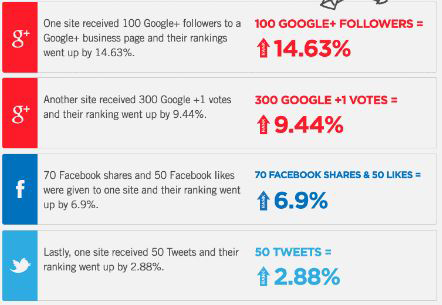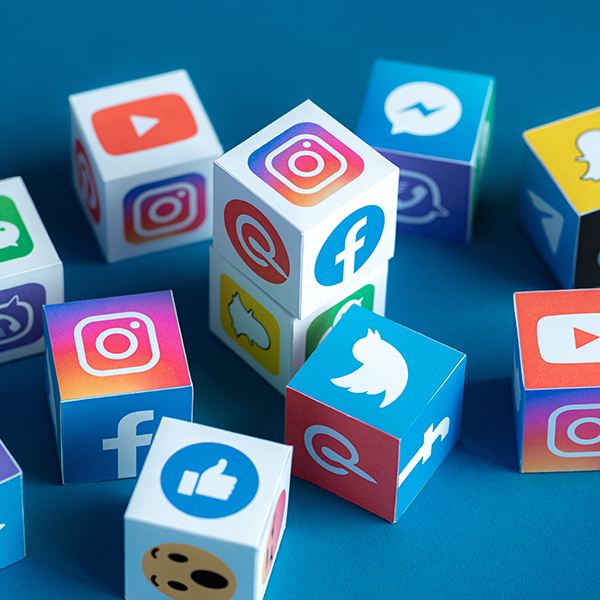Do Social Signals Improve SEO Keyword Rankings?

According to Google's Matt Cutts, social signals do not influence rankings as of yet. He first stated this in response to the many claims that Google +1s could influence rankings.
In case you missed it, I dug deeper into the anatomy of Google Plus and showed how you could get do-follow links from it. The very fact that you can get do-follow links as a result of someone giving your website a +1 seems to discredit the claim that G+ has no influence on rankings and I am not the only one who seems to think this.
QuickSprout Says Social Matters
According to a study conducted by Quicksprout, there is a noticeable difference in the position of a keyword when social signals are given. Here are their findings.

Image property of Quicksprout
As you can see, two different sites showed an increase in rankings that correlated with Google Plus activity and another two sites were positively influenced by Facebook and Twitter signals. You can read the full study on SearchMetrics and you can view an infographic of the data on Quicksprout's Blog.
Stone Temple Says No On Google +1s
Many people argue that correlation is not causation which is what a study by Stone Temple Consulting attempted to demonstrate.
Image property of Stone Temple
The results of their study only led to more heated debates by industry professionals, but they do determine that at a minimum, Google +1s drive discovery and that they most likely lead to faster indexing. The study also notes visits by GoogleBot to the shared page shortly after the +1 occurred. Stone Temple goes on to note that repeat visits are made to the same page from subsequent shares.
Stone Temple Says No to Facebook Too
A few months after the study on the impact of Google +1s was completed, Stone Temple decided to test the impact of Facebook likes and shares. This study was set up like the G+ study in that it attempts to show causation instead of correlation and here is what they decided.
- Google is not likely to count likes as a ranking factor because they cannot distinguish the source of the like to establish credibility.
- Getting shares on Facebook is also not likely to directly impact your rankings as a high percentage of even authority Facebook posts are not indexed by Google.
So What Can We Deduct from the Studies?
Since both Quicksprout and Stone Temple are very reliable sources for information, it is safe to assume that they each had the results they disclosed. As pointed out by Stone Temple, correlation is not causation. This means we can assume that social signals do not always directly impact rankings and when we combine that with the information from Quicksprout we are left with the following possibilities.
1. The impact of social shares on keyword rankings is dependent upon the niche and competitiveness of a keyword. This could explain why Stone Temple did not see a result and QuickSprout Did.
2. Great content is more likely to be shared and as such, natural links will occur and result in increased rankings. In the Stone Temple Study, no inbound links were indexed for the test pages, in the QuickSprout study, it is not disclosed whether natural links occurred as a result of the shares so we can assume the shares led to links and that is the cause.
Here is My Thought
When social shares occur in conjunction with inbound links, they validate one another and have a greater impact on rankings. We know that Google can determine an unnatural influx in back links to a site; so why are all sites not penalized for inbound link spikes?
We also know that a variation in the typical links occurring to a page can be a warning sign and for this reason, a brand new site getting 500 links in a single day is a red flag whereas an established site can get that many without issue.
If you consider a piece of viral content, you could literally have hundreds or thousands of links built to a page in a very short time and these links can be international, from un-related or semi-related sites, and they can come from sites with no PR or authority.
If you have a new site or one with a history of generating few back links and you attempted to build links to that site rapidly, you would likely get penalized. If that piece of viral content mentioned above happened to be on your new site and it lead to a massive influx of links, you are more likely to improve your rankings than to get in trouble.
Why is this?
The difference in the two is social signals and citations. By citations I am talking about un-linked mentions of a brand or website on other sites.
If you were to create an SEO campaign that mimicked viral marketing, you would need to
- Create massive social signals across Twitter and Google+
- Generate a measurable increase in the amount of citations to a brand or site
- Rapidly increase the number of inbound links with variables based on the link profile of a relevant authority site
If we created a campaign that met the above criteria, would we be able to rank more effectively and quickly than the current methods used industry wide? What if we were just to combine those factors into a typical campaign; would we be able to dominate any vertical? Can social signals alone generate enough natural links to rank sites? I will answer those questions and more in my upcoming webinar on July 9.
What are your thoughts? How Important Do You Think Social Media Is to SEO?
 Author Bio: Travis Bliffen is the founder of Stellar SEO, a search marketing and design agency located near St. Louis Mo. Travis loves researching and writing about SEO strategies and implementing innovative strategies for his clients. Connect on Twitter @theseoproz.
Author Bio: Travis Bliffen is the founder of Stellar SEO, a search marketing and design agency located near St. Louis Mo. Travis loves researching and writing about SEO strategies and implementing innovative strategies for his clients. Connect on Twitter @theseoproz.








